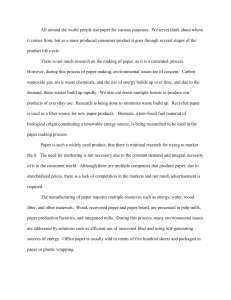December 12, 2008 TRANSITION PAPER The Paper Recycling
advertisement
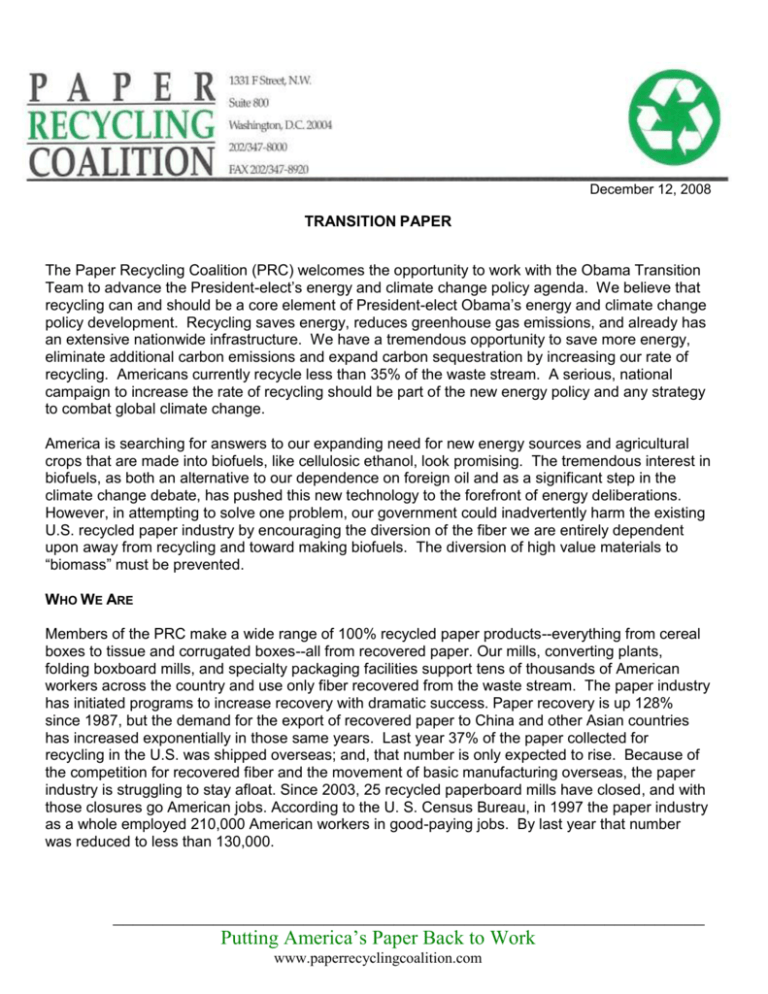
December 12, 2008 TRANSITION PAPER The Paper Recycling Coalition (PRC) welcomes the opportunity to work with the Obama Transition Team to advance the President-elect’s energy and climate change policy agenda. We believe that recycling can and should be a core element of President-elect Obama’s energy and climate change policy development. Recycling saves energy, reduces greenhouse gas emissions, and already has an extensive nationwide infrastructure. We have a tremendous opportunity to save more energy, eliminate additional carbon emissions and expand carbon sequestration by increasing our rate of recycling. Americans currently recycle less than 35% of the waste stream. A serious, national campaign to increase the rate of recycling should be part of the new energy policy and any strategy to combat global climate change. America is searching for answers to our expanding need for new energy sources and agricultural crops that are made into biofuels, like cellulosic ethanol, look promising. The tremendous interest in biofuels, as both an alternative to our dependence on foreign oil and as a significant step in the climate change debate, has pushed this new technology to the forefront of energy deliberations. However, in attempting to solve one problem, our government could inadvertently harm the existing U.S. recycled paper industry by encouraging the diversion of the fiber we are entirely dependent upon away from recycling and toward making biofuels. The diversion of high value materials to “biomass” must be prevented. WHO WE ARE Members of the PRC make a wide range of 100% recycled paper products--everything from cereal boxes to tissue and corrugated boxes--all from recovered paper. Our mills, converting plants, folding boxboard mills, and specialty packaging facilities support tens of thousands of American workers across the country and use only fiber recovered from the waste stream. The paper industry has initiated programs to increase recovery with dramatic success. Paper recovery is up 128% since 1987, but the demand for the export of recovered paper to China and other Asian countries has increased exponentially in those same years. Last year 37% of the paper collected for recycling in the U.S. was shipped overseas; and, that number is only expected to rise. Because of the competition for recovered fiber and the movement of basic manufacturing overseas, the paper industry is struggling to stay afloat. Since 2003, 25 recycled paperboard mills have closed, and with those closures go American jobs. According to the U. S. Census Bureau, in 1997 the paper industry as a whole employed 210,000 American workers in good-paying jobs. By last year that number was reduced to less than 130,000. ___________________________________________________________ Putting America’s Paper Back to Work www.paperrecyclingcoalition.com RECYCLING AND GREENHOUSE GAS REDUCTIONS Among its many economic, environmental, and resource conservation benefits, paper recycling substantially reduces greenhouse gas (GHG) emissions. In 2006, estimated avoided GHG emissions from paper recycling activities totaled over 115 million metric tons of CO 2 equivalents (CO2e). This is the equivalent of the CO2 annually emitted by 247 coal-fired power plants. And, as paper recycling increases, additional CO2e emissions will be avoided. WHAT ACCOUNTS FOR THE CO2E REDUCTIONS? The collection and reuse of recyclable paper reduces GHG emissions at three major points along the materials’ lifecycle. 1) 2) 3) Because paper is not put into landfills to decompose, there are GHG reductions resulting from avoided methane gas creation and emission. It requires less energy to produce paper products from recovered fiber. Recovering paper extends the fiber supply and contributes to carbon sequestration. WHAT IS NEEDED TO DELIVER EVEN MORE FROM THE RECYCLING SECTOR? Climate change policy being considered at the federal or state level should incorporate the following provisions. In a mandatory cap-and-trade system, recycling projects should be recognized as carbon “offset” project types. Provisions for identifying covered regulated facilities and the issuance of emissions allowances should take into account the vital role of domestic manufacturing facilities that make significant use of recyclable materials as feedstock. Any loss of domestic materials recovery capacity will lower the life-cycle emissions benefits associated with materials recovery. Tax incentives, grants, and other sources of funds should be directed to investments that are designed to reduce greenhouse gases in existing public and private recycling programs. Support is needed to strengthen the collection, transportation, processing, and manufacturing infrastructure. That would help counterbalance the increased burden to recycling from energy cost increases associated with regulation of greenhouse gases. The EPA should be tasked with quickly developing greenhouse gas measurement protocols that permit the inclusion of recycling-related projects in climate policy and offset markets. Any climate change initiative should include careful consideration of the amount of potential avoided CO2e that is being “shipped overseas” via recovered paper. WHAT SHOULD BE AVOIDED TO MAKE THESE POLICIES WORK? The diversion of high value materials to “biomass” must be prevented. The terms “biofuels,” “biomass,” and “cellulosic ethanol” hold a variety of interpretations, but they are primarily seen as part of our future energy solution. However, to paper recyclers, it means potentially creating incentives to divert recovered paper away from recycling and direct it to “burning for energy.” All economic uses of biomass are not equal. We support programs that encourage the development of biofuels; we simply want those programs to be carefully drawn to encourage the use of materials that are now largely underutilized (such as slash and switch grass) rather than materials (such as used paper) that already have economic viability in the marketplace--without government subsidies or tax incentives. The PRC strongly supports the development of new alternative fuels and we are not against competing for fiber on the open market. However, we do not want them to have a non-competitive economic advantage because of government subsidies. The PRC requests that this issue be permanently put to rest by creating biomass definitions that contain an exemption for “paper that is commonly recycled,” as in the Energy Policy Act of 2005 (Section 932). Mills that make 100% recycled paper cannot use virgin fiber; they are totally reliant on recovered fiber. Therefore, if the federal government creates an artificial, government-underwritten financial incentive for a new industry to use our raw material, it could skew the price of recovered fiber, putting us at a competitive disadvantage.


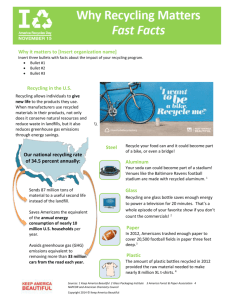
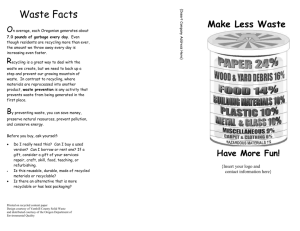

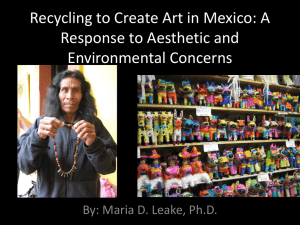

![School [recycling, compost, or waste reduction] case study](http://s3.studylib.net/store/data/005898792_1-08f8f34cac7a57869e865e0c3646f10a-300x300.png)
